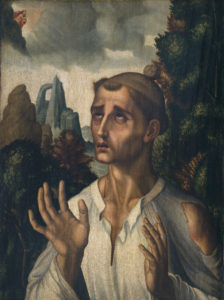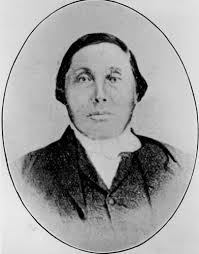Welcome to the Saintly Sixteen! From 32 saints we have narrowed the field to 16. For this round, rather than the basic biographical information we enter the realm of Quirks and Quotes. Our Celebrity Bloggers will provide unusual information or legends surrounding their saints along with quotes either by or about their saints.
Don't forget, you can always go to the Bracket Tab to easily find previous battles if you need to refresh your basic knowledge on these saints. This is yet another free courtesy extended to you, the Lent Madness Global Public.
Today we kick things off with Stephen, the Church's protomartyr vs. the Canadian Henry Budd. At stake? The Elate Eight.
Yesterday in another close contest, Fanny Crosby defeated G.F. Handel 53% to 47% to claim the last remaining spot in the Saintly Sixteen. Speaking of which, the Saintly Sixteen begins RIGHT NOW! Time to vote...
Stephen
 On the day following Christmas, Christians move from hearing the stories of the Christ child to hearing the account of the death of Saint Stephen. The connection between Christmas and the first martyr of the church does not seem to be an accident. The Golden Legend proclaims that “Yesterday Christ was born in earth, that this day Stephen should be born in heaven.”
On the day following Christmas, Christians move from hearing the stories of the Christ child to hearing the account of the death of Saint Stephen. The connection between Christmas and the first martyr of the church does not seem to be an accident. The Golden Legend proclaims that “Yesterday Christ was born in earth, that this day Stephen should be born in heaven.”
The date (December 26 in the West, December 27 in the East) of Stephen’s commemoration was observed very early, and could have been the actual day of his death, the day his remains were discovered and transferred, or simply an observation that nothing says “Christmas” like a good public stoning – in fact, in Germany the day is sometimes called “second Christmas.”
Regardless of the reason for the date, the remembrance of Deacon Stephen as a servant of the poor caused a particular 10th century Bohemian royal to head out into the deep, crisp, and even snow to provide for a local peasant – a journey memorialized by John Mason Neale’s carol, “Good King Wenceslaus.” The last line of that carol is a witness to the work of Stephen as one of the first Deacons: “Ye who now will bless the poor, shall yourselves find blessing.”
What we know of Stephen’s life comes to us in the brief account of Acts 6 and 7. But the legend of Stephen continues the story – in death, Stephen’s work was not done. According to the Golden Legend, Stephen sent none other than Gamaliel to arouse a priest in Jerusalem to come and uncover his remains.
Augustine of Hippo devotes an entire chapter of his Confessions to the miracles attributed to Stephen when his relics were in North Africa. These included the healing of wounds, blind gaining sight, and numerous accounts of raising the dead.
The remains of Stephen eventually wound up at the Basilica of Saint Lawrence outside the Walls – the resting place of Saint Lawrence, one of the first seven deacons of the church in Rome. Apparently, Lawrence was excited to welcome the first martyr of the church and the patron saint of deacons. When Stephen’s remains were brought there, the remains of Lawrence “as if enjoying his coming and smiling” moved over on their own accord to make room for Stephen.
In the book of Acts, Stephen preaches the longest of the sermons recorded in that book – a sermon which ends with the accusation of his hearers: “You stiff-necked people, uncircumcised in heart and ears, you are forever opposing the Holy Spirit.” Stephen’s honesty is commendable, as is the realization that it directly leads to his martyrdom.
Preaching on St. Stephen’s Day, Kaj Munk draws out the Christmas connection of Stephen’s martyrdom: “True Christmas joy, no matter how much or how little of it you comprehend, means that you go where He wants you to go.”
Henry Budd
 The Rev. Henry Budd was the first First Nation person in North America to be ordained in the Anglican Church, and he spent most of his ministry in the Canadian west in an area commonly known as The Pas. Some of Henry Budd’s journals have been preserved, giving us a vision of the challenging ministry in the 19th century in the wilderness.
The Rev. Henry Budd was the first First Nation person in North America to be ordained in the Anglican Church, and he spent most of his ministry in the Canadian west in an area commonly known as The Pas. Some of Henry Budd’s journals have been preserved, giving us a vision of the challenging ministry in the 19th century in the wilderness.
Budd’s ministry for Christ thrived because he lived with and loved the people he served. He writes of a typical day in August: “The whole week have been devoted to the hay, and our hay is nearly all done. More canoes have arrived. In the evening assembled the people in the Schoolroom for prayer and praise.” He worked with those he served and love, and prayed with them.
Life in ministry is not without challenges. Budd shares his frustration on the Sunday after Christmas: “The Lord’s-day [and] We went over to the Fort at the usual time, in hopes that we would have as good a congregation as we had yesterday, but I found but few that were in a fit state for the worship of God. The greater part of them had been drinking the whole of last night, and of course were unfit this morning for the service of God. They have lost a sermon this day on account of the rum, and who can say whether they will have the opportunity of hearing another? There were, however, some of them who attended, and were present at the morning service.”
The day-to-day tasks of Budd’s ministry are entwined together with longer entries reflecting his deep faith in Christ. “I always think that it is time that I should do something, while in perfect health and strength, to make manifest my gratitude and love to that God, who, I can truly say, has been so good to me all my life…. But by the grace of God alone, we have succeeded in our object in a great measure.
The Rev. Henry Budd died after over 35 years of dedicated ministry. A member of the Cree tribe, reflecting on Budd’s death, shared, “sorry does not express what we felt. My own father died some years ago, but when Mr. Budd died, I felt for the first time what it meant to be an orphan.”
[poll id="188"]
160 comments on “Stephen vs. Henry Budd”
My vote goes to Henry Budd, as it did to David Oakerhater. I rejoice when we pay homage to the faithful ministry of native people.
I voted for the Rev. Henry Budd for several reasons, one of which is that his write up on this page did not perpetuate the idea that Christmas has only one day. Christmas is 12 days long, because without the Incarnation the rest of the liturgical year would be pointless, therefore it is the most important
celebration of the year and needs an octave and a half of celebrating.
Also, while not all deacons become priests, all priests (and bishops and archbishops too) are still deacons.
Late in his ministry my father served Dakota churches in the Upper Midwest. My children were small at the time and got used to brown clergy visiting with Dad when he was in town; I think that was an important factor in their later acceptance of all races and ethnicities. My father loved working with the First Nations congregations, but also spoke of the challenges involved. Still, it was for him the high point in over four decades of ministry. By now you have probably figured out my vote was for Henry Budd.
Stephen! Feast day is Dec 26. Day after Christmas. Helps me to remember the light and darkness and courage that it takes to take these brave steps to live fully into God's call
Stephen had me at "uncircumscribed hearts and ears," so I had to go with him. That takes guts.
Saint Stephen all the way!
I am voting for Henry so late in the day because I feel it is easier to believe passionately so close to Jesus's time on earth but harder to work 1800 years later in an obscure settlement with fickle parishioners and love them through the day to day tedium of life. But I fear it is a lost cause!